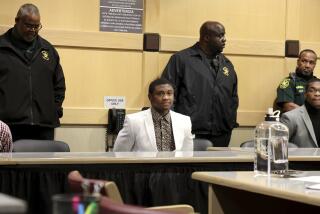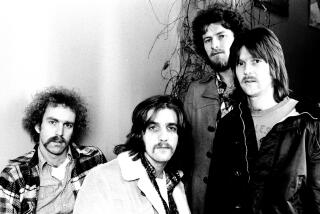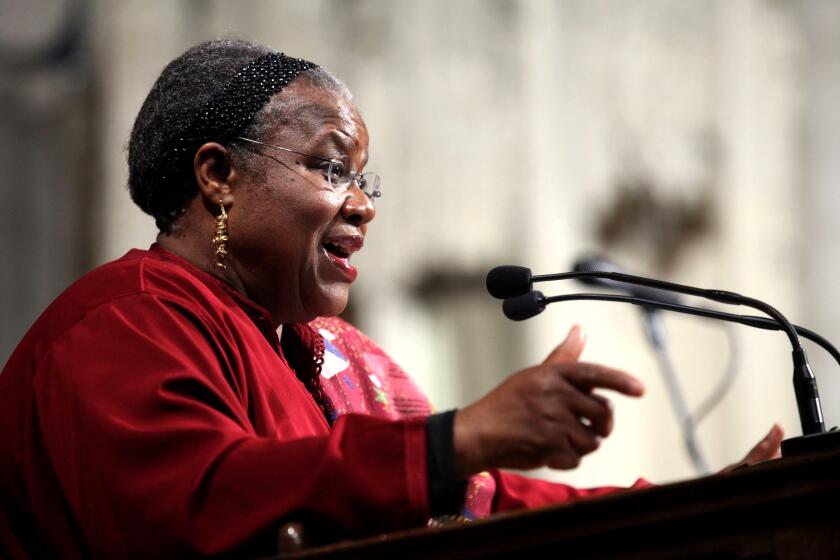STAFF VETERANS REPLACED : NEW OWNER CLEANS HOUSE AT KFAC
Housecleaning by new management is standard operating procedure at rock radio stations.
When KHJ-AM became KRTH-AM a year ago, two dozen pink slips went out on a Friday and a new staff was on the air Monday morning.
But that just doesn’t happen at staid, steady bastions of good taste like KFAC-AM (1330) and FM (92.3), where most of the announcers first went on the air before John F. Kennedy became President.
On New Year’s Eve, however, the ax began falling on some of the longest-surviving voices in Los Angeles radio: Tom Dixon (41 years as a KFAC personality), Fred Crane (39 years), program director and “World of Opera” host Carl Princi (33 years), “Luncheon at the Music Center” host Martin Workman (10 years) and Doug Ordunio (8 years).
“Actually it’s closer to 13 years but I didn’t go on the air until about eight years ago,” Ordunio told The Times. “I was there for a substantial amount of time, but, relatively, I was the new kid on the block.”
Ordunio said that he was notified on New Year’s Eve that he would not fit into the new format that the stations’ new owners, Classical Communications, Inc., had in mind.
Classical Communications, headed by Louise Heifetz, daughter-in-law of violinist Jascha Heifetz, completed its purchase of the two stations last month for $33.5 million, announcing shortly after the takeover that Princi would be leaving and hinting that more sweeping changes might be in the works.
This week Heifetz and new program director Robert Goldfarb made good on those hints.
“Essentially it’s a brand-new radio station that we introduced yesterday (Monday) morning,” Heifetz told The Times.
Though there were predictable complaints from longtime listeners, it was too early--even for Ordunio and the other ex-KFAC announcers--to predict whether the new approach to classical-music broadcasting would be successful.
According to Heifetz, KFAC is now officially 100% classical: no Broadway show tunes, no jazz (A. James Liska, who hosted a long-running weekend jazz program, was also fired on New Year’s Eve), film scores or semi-classical music will be heard over the KFAC frequencies.
The 12 minutes of commercials that aired in an average KFAC hour will also be cut down substantially, she said. Mutual Broadcasting news, an on-the-hour mainstay of KFAC for years, is being replaced by in-house news reporting. Longer classical works, including complete symphonies, will air without commercial interruption, she said.
“The commitment is to play great works by great performers,” she said. “You will be hearing more familiar-sounding music by the greatest composers--Beethoven, Mozart, Bach, Brahms.”
All that remains of the old KFAC as of this week is Thomas Cassidy’s Monday-through-Saturday “Evening Concert” series, heard from 8 p.m. to 10 p.m. The only reason Cassidy survived is that he and his program are under separate contract to the “Evening Concert” sponsor, the Southern California Gas Co.
The other announcers were all covered by the American Federation of Television and Radio Assn. contract, which contains no provision for protection from termination in the event of a change in ownership at a station.
The new lineup includes far younger, though experienced, announcers such as Rich Capparela from KFAC’s rival classical music station, KUSC-FM (91.5). He joins John Santana, Bernie Alan and Mary Fain as part of the new, streamlined KFAC on-air team.
KUSC general manager Wallace Smith, who almost lost another of his staff--Los Angeles Philharmonic hostess Gail Eichenthal--to KFAC last month, said Tuesday that he will be looking at the dismissed KFAC staff as possible KUSC announcers, but he expressed “serious doubt” that they would fit the format there.
He had high praise for their dedicated service at KFAC, however.
“Long before there was a KUSC or even a gleam of it in the eye of the University of Southern California, these men were the standard-bearers for classical music in this community,” Smith said. “The community owes them a great accolade for that contribution.”
Though he did not dismiss the possibility that the KFAC transition might result in a kind of “classical-music war” between noncommercial KUSC and commercial KFAC, Smith said he hoped that classical-music listeners would be the winners by having a better choice of music.
Heifetz, who joined Goldfarb in the quick and what some listeners and station employes were calling ruthless firing of the KFAC veterans, defended their actions.
“I’m not sure, when you make a transition, that there’s any real smooth way to do it,” Heifetz said. “Personally, I feel we did this in the smoothest way we possibly could have.”
Ordunio disagreed.
“Workman was fired as soon as he got off the air at the Pavilion Restaurant on Dec. 31,” he said. “They paid him a visit at the Music Center and gave him notice. (Tom) Dixon didn’t even get to finish his shift. They brought in John Santana right in the middle of his shift.”
“It was a nice happy new year for all of us,” Ordunio said.
More to Read
The biggest entertainment stories
Get our big stories about Hollywood, film, television, music, arts, culture and more right in your inbox as soon as they publish.
You may occasionally receive promotional content from the Los Angeles Times.






